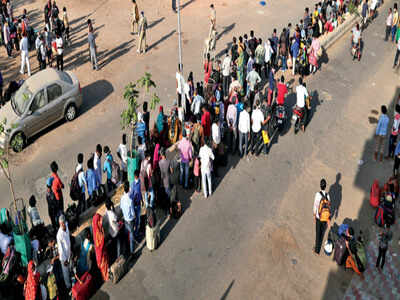
AHMEDABAD: As the state government has arranged special Shramik trains to facilitate the movement of migrant labourers, industries are concerned about production getting hampered. Industrial production may take a hit for at least three months according to estimates by industry associations. With relaxation of curbs on industries in certain parts of the state, industrial units which have resumed operations are barely operating at 30-50% capacity right now. Industrialists are worried that the movement of migrant labourers will further hamper their production capacity.
"While industries have received permissions to operate, labour shortage is expected to trigger production woes for industrial units because of the the recent movement of labourers," said Chintan Thaker, co-chair, Assocham-Gujarat council. "Most are also engaged in agriculture in their native place and thus will not return till sowing is completed."
According to estimates by the state labour and employment department, some 3 lakh migrant workers have been sent back from Gujarat to their home states in special trains as on Tuesday.
"The exodus of migrant workers will result in a shortage of labourers and subsequent reduction in production when the lockdown is lifted as these workers form a large part of the workforce," said Rajendra Shah, president, Changodar Industries Association.
At 40-45%, worker turnout is low at the industries due to the lockdown and migrant workers returning to their home states has further reduced the workforce, which has added to the woes of industrial units. There are as many as 500 units in the Changodar industrial area, which roughly employs 1 lakh labourers. Of these, around 30-35% are migrant workers from outside Gujarat and other regions of the state.
In certain estates, migrant labourers comprise at least 70% of the workforce or even more at several industrial estates around Ahmedabad. "Barely 20% units are functional at present in the estates of Vatva and Naroda and most are currently operating at less than 30-50% capacity," said Yogesh Parikh, president, Gujarat Dyestuff Manufacturers' Association. "When more units are given permission to operate, the labour shortage will only intensify."
"While industries have received permissions to operate, labour shortage is expected to trigger production woes for industrial units because of the the recent movement of labourers," said Chintan Thaker, co-chair, Assocham-Gujarat council. "Most are also engaged in agriculture in their native place and thus will not return till sowing is completed."
According to estimates by the state labour and employment department, some 3 lakh migrant workers have been sent back from Gujarat to their home states in special trains as on Tuesday.
"The exodus of migrant workers will result in a shortage of labourers and subsequent reduction in production when the lockdown is lifted as these workers form a large part of the workforce," said Rajendra Shah, president, Changodar Industries Association.
At 40-45%, worker turnout is low at the industries due to the lockdown and migrant workers returning to their home states has further reduced the workforce, which has added to the woes of industrial units. There are as many as 500 units in the Changodar industrial area, which roughly employs 1 lakh labourers. Of these, around 30-35% are migrant workers from outside Gujarat and other regions of the state.
In certain estates, migrant labourers comprise at least 70% of the workforce or even more at several industrial estates around Ahmedabad. "Barely 20% units are functional at present in the estates of Vatva and Naroda and most are currently operating at less than 30-50% capacity," said Yogesh Parikh, president, Gujarat Dyestuff Manufacturers' Association. "When more units are given permission to operate, the labour shortage will only intensify."

Coronavirus outbreak
Trending Topics
LATEST VIDEOS
City
 Congress leader C M Ibrahim writes to Karnataka CM to allow Muslims to offer prayers at masjids during Eid
Congress leader C M Ibrahim writes to Karnataka CM to allow Muslims to offer prayers at masjids during Eid  Delhi court judges self-quarantine after coming in contact with Covid-19 patient
Delhi court judges self-quarantine after coming in contact with Covid-19 patient  Railways to introduce waiting lists for special trains from May 22; likely to run more trains
Railways to introduce waiting lists for special trains from May 22; likely to run more trains  Delhi Customs seizes over 5 lakh masks and PPE kits heading abroad
Delhi Customs seizes over 5 lakh masks and PPE kits heading abroad
More from TOI
Navbharat Times
Featured Today in Travel
Quick Links
Kerala Coronavirus Helpline NumberHaryana Coronavirus Helpline NumberUP Coronavirus Helpline NumberBareilly NewsBhopal NewsCoronavirus in DelhiCoronavirus in HyderabadCoronavirus in IndiaCoronavirus symptomsCoronavirusRajasthan Coronavirus Helpline NumberAditya ThackerayShiv SenaFire in MumbaiAP Coronavirus Helpline NumberArvind KejriwalJammu Kashmir Coronavirus Helpline NumberSrinagar encounter
Get the app





